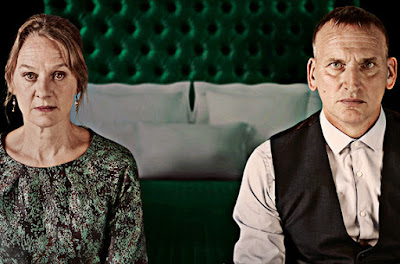Back in March, when we saw that David Tennant would be playing Richard II at the
RSC, some friends and I decided to book tickets, as what could be better that Shakespeare, David Tennant and friends?
 |
| . |
The performance we had tickets for was yesterday evening, at the Royal Shakespeare theatre in Stratford Upon Avon.
I booked the whole day off work, and drive up in the morning, so 3 of us were able to meet up and have lunch, and then spend most of the afternoon (joined by the other two members of the party) catching up with one another's news, before a very nice pre-theatre dinner.
And then, the main event!
 |
| The Theatre |
It was excellent. David Tennant as Richard II was superb, but the cast over all was very strong - David Tennant is obviously the headline star but this is not a one man show - I was particularly impressed by Nigel Lindsay (Bolingbroke/Henry IV), who is presented as a blunt, plain-speaking man, a warrior, who does come over as, initially, seeking to recover his inheritance rather than to usurp the throne.
Unlike the other men in the play, who appear initially in mail, with swords, Richard is a regal, but frail-looking figure with long hair (Which takes a little getting used to) and long, formal robes - making a clear visual contrast between him and his courtiers.
I think Tennant is strongest in the later scenes in the play, as he loses his grip on his Kingdom. Richard does not come across as a likeable character - even in defeat, he is sarcastic, taunting Bolingbroke.
Michael Pennington's John of Gaunt was excellent - as the only other production of Richard II I have seen is the 'Hollow Crown' TV version, in which Patrick Stewart played Gaunt, so Pennington had a lot to live up to. And he did.
And a special mention is due to Oliver Rix (Aumerle), close to, and loving the King, but ultimately murdering him.
 |
| Picture from RSC website and (c) RSC |
The only issue I had with the production was with some of the staging - there was a gantry at the back of the stage - we were a little worried that Richard and Aumerle were going to fall off, then later, during Act III Scene III, as Richard appears on the walls of Flint Castle - unfortunately, from our seats in the circle, the King was (apart from his ankles) wholly invisible. The ankles were very regal, but I cannot help but think that being able to see Mr Tennant in the full glory of his gold-embroidered robes might have been more impressive still. It seems a poor choice to have a critical scene in the play invisible to even part of the audience. But other than that, it was a superb production!
The Stratford and London runs are both, I believe, sold out, but the show is going to be
broadcast live on 13th November. I recommend it.
Fun fact. On Friday morning, I heard David Tennant talking,
on the radio, about a ring which was worn by Ian Richardson when he played Richard II, and given, by his widow, to David Tennant.
Last night, he dropped it. Perhaps he has smaller fingers.


























